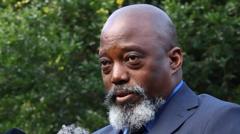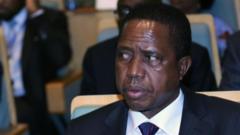The latest ban on former President Joseph Kabila's political party, PPRD, follows allegations of his connections to the M23 rebels, intensifying an already unstable political climate in the Democratic Republic of Congo.
Kabila’s Party Outlawed Amid Rising Tensions in DR Congo

Kabila’s Party Outlawed Amid Rising Tensions in DR Congo
The Congolese government has accused ex-president Joseph Kabila of having ties to the M23 rebel faction, leading to the ban of his party.
The Democratic Republic of Congo (DRC) is reeling from recent political upheaval as the government has officially banned the political party of former President Joseph Kabila, citing alleged links to the M23 rebel group. This drastic measure coincides with Kabila’s return to the country after a two-year exile in South Africa, where he reportedly resided following his departure in 2023.
The M23, a group accused of receiving support from Rwanda, has made significant territorial gains in eastern DRC, particularly taking control of the town of Goma in January. The Congolese Interior Ministry’s decision to dissolve Kabila's party, the People's Party for Reconstruction and Democracy (PPRD), stems from what it describes as the party's “ambiguous attitude” towards the violence in the region. Kabila's return to Goma is viewed by some government officials as allegiance to the "enemy," and the ministry has also accused him of high treason.
Despite the accusations, Kabila has publicly denied any involvement with the M23, and details surrounding his movements have been shrouded in uncertainty as his party has yet to issue a formal response. His spokesperson hinted that Kabila would soon address the nation, with speculation surrounding the timing of his statements. In an earlier interview with the French-language magazine Jeune Afrique, Kabila expressed a desire to aid in resolving the escalating crisis in DRC, as he described a lengthy period of political withdrawal and exile.
Kabila, who succeeded his father Laurent Kabila as president in 2001, had a controversial tenure that lasted 18 years, marked by allegations of election manipulation and unrest during his refusal to step down from power. His criticisms of successor Félix Tshisekedi claim the two politicians entered a secret pact to exclude another candidate from power, a point both Kabila and Tshisekedi deny.
Political commentary suggests that Kabila's relationship with the M23’s leadership raises several questions about stability and security in the DRC and how past alliances may influence present dynamics. As tensions rise in this Central African nation, Kabila’s significant political maneuvers continue to be scrutinized, with both domestic and international observers keenly watching future developments.





















